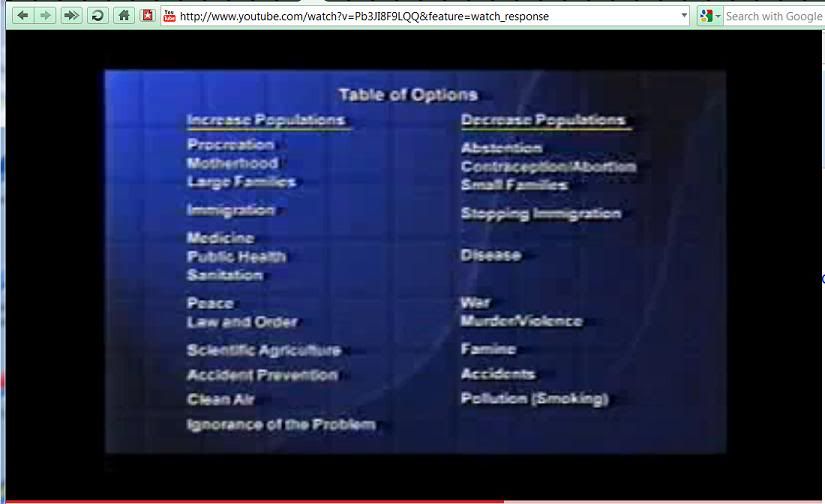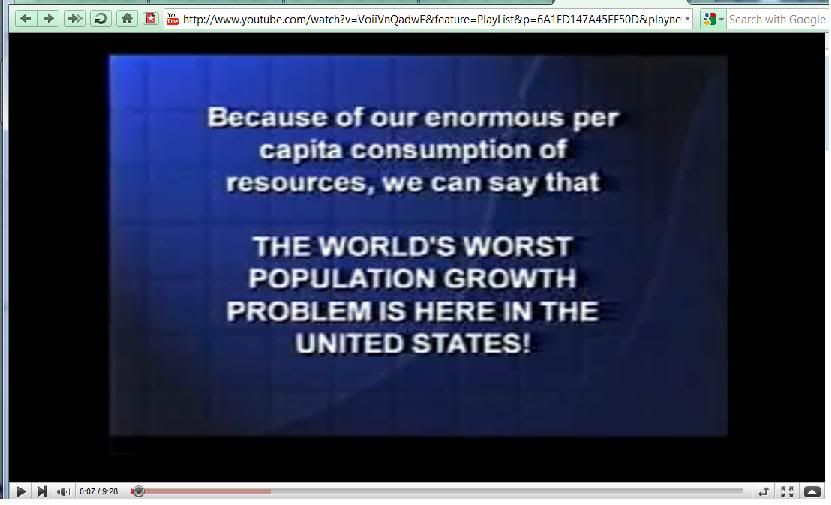Thanks for this discussion, tempering my thinking on this. BTW, I goofed and the 2-column "Table of Options" is in Part 2 (not after 3) and that's the 'what we can do' part to which I referred... so... never mind.

What I got from the Bartlett lecture is, 'In a world of rising consumption, if we're not careful, a serious and sudden hydrocarbon shortage is going to kick our ass. Not only that, but this reality is being covered up with misleading and inflated reserve estimates.'
The way things are in the world, I'm okay with putting the brakes on a little, by encouraging later marriage, more education, and more contraceptives available far and wide. We should be starting now (and we are, good) because it takes a long time to put things into effect, thanks partly to impediments like the Population Research Institute.
here are a couple of less alarming but more informative clips:
I watched the three videos, and the first one, especially, seems loaded with corporate-agenda subtext, and glosses over things like the petroleum requirements of all the "infrastructure development" and big agribiz the video implies will save the day. (More on that below.)
The videos were made by the Population Research Institute
(http://www.pop.org), their number one concern is abortion---though it's been said that
PRI "is best known for its mission to stop family planning in the poorest regions of the world."
(http://www.huffingtonpost.com/cristina- ... 42299.html)I get the feeling that PRI doesn't actually care all that much about population numbers per se. And why should they?---the Rapture will be along soon...
Our Founder
Fr. Paul Marx, O.S.B. was a pioneer in the worldwide pro-life movement....
After nearly two decades on the faculty of St. Johns University, he was permitted by his order to work on pro-life issues full time.
http://www.pop.org/20090117804/our-founderAlong with abortion, PRI also doesn't like feminists, gays or Communists (especially China), or any kind of artificial birth control. They like Sarah Palin, Pat Robertson and Glenn Beck.
(http://www.pop.org/press-releases/) In fact, Steven Mosher, PRI's president, has guested on the Glenn Beck show and other FOX Noise programs.
(http://video.foxnews.com/v/3926103/)Mosher was paid $104,090 in 2008, out of over $900,000 PRI spent that year, so they have a goodly income.
(http://www.charitynavigator.org/index.c ... rgid=10080) We can skip over the issue of Mosher's expulsion from Stanford for "illegal and unethical conduct," in connection with his anthropological work in China
(http://en.wikipedia.org/wiki/Steven_W._Mosher), because it's a little sketchy; China claims Mosher was a spy.
 (http://www.claremont.org/publications/c ... detail.asp)
(http://www.claremont.org/publications/c ... detail.asp)PRI gets almost all its funding from charitable contributions, and its biggest funder seems to be The Lynde and Harry Bradley Foundation Inc.
(http://mediamattersaction.org/transpare ... te/funders)The Lynde and Harry Bradley Foundation, Inc.
ein: 39-6037928
355 institutional roles for $30,396,079
1241 North Franklin Place
Milwaukee, WI 53202
http://www.bradleyfdn.org/With $706 million in assets (2005), the Lynde and Harry Bradley Foundation of Milwaukee, Wisconsin is the country's largest and most influential right-wing foundation. As of the end of 2005, it was giving away more than $34 million a year [Bradley Foundation 2005 IRS 99-PF].
... Its financial resources, its clear political agenda, and its extensive national network of contacts and collaborators in political, academic and media circles has allowed it to exert an important influence on key issues of public policy. While its targets range from affirmative action to social security, it has seen its greatest successes in the areas of welfare "reform" and attempts to privatize public education
... The overall objective of the Bradley Foundation, however, is to return the U.S. - and the world- to the days before governments began to regulate Big Business, before corporations were forced to make concessions to an organized labor force. In other words, laissez-faire capitalism: capitalism with the gloves off.
... the list of Bradley grant recipients reads like a Who's Who of the U.S.Right.
...such major right-wing groups as the Heritage Foundation, ...the American Enterprise Institute for Public Policy Research, literary home for such racist authors as Charles Murray (The Bell Curve) and Dinesh D'Souza (The End of Racism), former conservative officeholders Jeane Kirkpatrick, Jack Kemp and William Bennett, and arch-conservative jurists Robert Bork and Antonin Scalia.
... In 1903,Lynde and Harry founded a business that would become the Allen-Bradley Company, a major manufacturer of electronic and radio components. Harry was the more politically active of the two. A man with extreme right-wing views, he was an early financial supporter of the John Birch Society...
Robert Welsh, who founded the Society in 1958, was a regular speaker at Allen-Bradley sales meetings. Harry distributed Birchite literature, as did Fred Loock, another key figure at the company.
... Allen-Bradley was one of the last major Milwaukee employers to racially integrate, and then only through public and legal pressure.
... Things changed dramatically in 1985, when the Allen-Bradley Company was sold to Rockwell International, a leading defense and aerospace conglomerate, for a whopping $1.651 billion. The Foundation benefited heavily from the sale, seeing its assets shoot up overnight from less than $14 million to more than $290 million, catapulting it into the ranks of the country's largest foundations. At that point its name was changed to the Lynde and Harry Bradley Foundation, to publicly separate it from the company.
(http://old.mediatransparency.org/funder ... funderID=1) 2005
The list of 2005 directors and 'notable members' rounds out with defense contractors, industrialists, corporate lawyers, bankers, a CIA-funded propagandist and William Bennett to boot.
I was struck by the corporate-aligned solutions in the videos the first time I watched them, and after learning they're made by a right-wing pro-life organization funded by a hard-right megafoundation founded by Birchers, I'm even more leery. The videos have some 'information' but they strike me as misleading, if only by omission.
Here's how I saw the videos:
The first video, "Food: There's Lots Of It," says that according to the UN, "There is enough food in the world today for everyone to have a healthy and productive life." Sounds like the UN want to put us on a diet? But where is all that extra food not getting to the hungry people? I suppose much of it passes through the drive-up windows of McDonald's---although there's not a word in the video about overconsumption of fuel and food in the 'developed' nations.
It says today we're "growing more food on less land" thanks to modern agricultural technology. We see a petroleum-powered tractor whizzing by, and a petroleum-powered airplane spraying what we have to assume are "technology"-laden Monsanto GM crops grown from terminator seeds, with toxic, petroleum-derived pesticides.
Bartlett asks, 'how, as population grows and petroleum wanes, are we going to produce all that petroleum-intensive food?'
We have so much food in the States, the narrator coos, that "the government can afford to pay farmers not to grow food, but instead, return their farmlands to the wild." Aww. But "returning to the wild" only happens when growers take their land out of production altogether and sell it to a conservation organization.
(http://www.journalgazette.net/apps/pbcs ... /801130356) Most farm subsidies today go to large corporate conglomerate farms and investors who use the money to buy more small farms, further locking their stranglehold on food.
(http://www.gao.gov/new.items/d01606.pdf)Then, "Africa, if cultivated using modern farming methods, could eventually feed the whole world!" We see a video wipe spread across the continent of Africa, symbolically blanketing it with, we safely guess, petroleum-intensive GM terminator-seed crops, cultivated with petroleum-powered machines and treated with a good shower of agribiz petrochemicals.
The video shows a chart listing the "Key Causes of Hunger" cited by the UN World Food Program: 1. Poverty; 2. Conflict; 3. Natural Disasters; 4. Exploitation of the Environment; and 5. Poor Agricultural Infrastructure. Let's look at how these are explained in the video:
First of all (after pointing out that "overpopulation is not on the list!"), they address the Key Causes of Hunger
out of order (2., 1., 5.), so you won't notice that they skip over and say nothing about (4.) environmental exploitation.
So, first, Conflict: wars interfere with food production. Nice epiphany but aren't most wars lately fought for the hydrocarbons on which the "modern farming methods" (and war-making power itself) depend?
We see some rebels terrorizing hungry natives and doing a "wheelie" in their petroleum-powered Jeep as they laugh and roar away with all the food. Rebels bad!
One epiphany after another: next we found out that a Key Cause of Hunger is---poverty. Makes sense; the reason those people are poor is, well, they're poor. I realize that a short video like this doesn't have time to get into more causes of hunger like corporate greed, contractor corruption, IMF swindles, theft of resources and so on.
Poor Agricultural Infrastructure is symbolized by a petroleum-powered truck crossing a rickety Third World bridge, which collapses. Quick, call Bechtel and the "infrastructure development" gang, set IMF "austerity measures" for the poor, displace locals and wreck their habitat.
"4. - Exploitation of the Environment" is ignored. They also skip over 3. - Natural Disasters, but those pretty much explain themselves, whereas facing the issue of environmental exploitation would take some explaining.
"This is why," the narrator says in closing, "reducing the number of hungry people will not make the remaining people less hungry," a pretty fuzzy claim.
"So blaming overpopulation for everything does nothing but distract us from the real problems that we actually have."
I can agree with that---but isn't there at least a potential for real overpopulation that we need to be aware of?
The second video, "Kids: Stable Population," it laudably advocates (or appears to advocate) zero population growth (eventually...not right now of course), with one generation's numbers replaced by the next. They don't say how that will be accomplished---certainly not with contraceptives!
The video ominously informs us that China and Indonesia are in grave danger of extinction because their replacement rates are falling. As far as I can see, this is completely specious. As for small indigenous groups facing extinction, isn't that usually caused by colonialization and "infrastructure development"?
In the third video, "Overpopulation: The Making of a Myth," Malthus walks up to a drinking derelict, bludgeons him with his cane and pokes the body to make sure it's dead. (That little touch did make me laugh.) That Malthus "recommended killing off the 'have-nots' of society, lest the 'haves' starve to death" might be a stretch, but I won't nitpick it because yes, Malthus was a cold-hearted elitist cocksucker and it's unfortunate that Bartlett associates himself with the name.
The video ends with the curious assertion, "The population of the Earth will peak in thirty years and then start to go back down."

I looked all over PRI's website for how they arrived at that conclusion but I couldn't find it.
I think my gut feeling, that there was something dodgy about the videos, is confirmed. PRI isn't so much concerned about population; they're concerned about population
control, opposing all contraceptives and abortion, in a context of right-wing politics, Big Money interests and Christian fundamentalism. These videos reflect that, and I think that's partly why their inferences and conclusions don't hold up well.
(Sorry this is so long)








